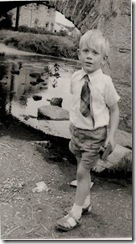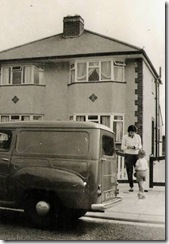Volume 2 – a new life begins - chapter 8 – a job does not guarantee a good future – part 2 – it would not be easy to leave Wales– post 69 – taken from chapter 34 – farewell to Wales - consisting of 10 pages from 64 to 73(420 to 429 ) edited on Saturday, 08 October 2011
 I view the lake and the camera man views me
I view the lake and the camera man views me
In the Clwyd Valley they still tell the story of the Rhuddlan Marsh Men, which describes the slaughter of the people of Rhuddlan. At the time of the Saxon invasion of Britain the village of Rhuddlan was a large and busy centre of trade and commerce. Trading ships were still able to enter the river and land their cargo at the old Roman quay where the castle now stands. With a much larger river the flat land of the valley was mostly marsh and at high tide it was covered in a shallow sheet of water. The locals had developed a way of living and working in this extensive area of marsh and flood, they had learned to move around on stilts, and everyone knew how to use them. This unique ability saved a few of them when a Saxon War Party arrived and with the usual savagery of that time in history, they proceeded to kill everyone, including women and children. Those that escaped kept this event alive with various stories poems and songs of lament to this very day.
Such things make up my memories of the time I lived in Wales; such thoughts help a person to understand in a modest way the meaning and the feeling of the Welsh story. If you have been to Harlech, seen the castle and heard the story, then you understand more fully what the song: ‘Men of Harlech’ is all about. Len Grant took me to Harlech on one of his work trips; it was the day that I saw the place where the perfect turf came from; for bowling greens and other places that need a perfect sward. I had a natural interest in people and places, but it was Len who encouraged me to take it further, and to derive some pleasure out of the search. When I became tied to a job and could not accompany Len on his field trips he had to travel alone, though sometimes he would take Ethel with him and occasionally his grandson Mark.
 The next picture I include is one that Len took on one of his outings when I was unable to join him. It is my son Mark a young Welshman in the making, it was taken on 5th August 1961 which would make him 3 years and 8 months old. The location was in the village of Llanfairtalhiarn which was 19 miles from Rhyl.
The next picture I include is one that Len took on one of his outings when I was unable to join him. It is my son Mark a young Welshman in the making, it was taken on 5th August 1961 which would make him 3 years and 8 months old. The location was in the village of Llanfairtalhiarn which was 19 miles from Rhyl.
Most of Len’s travelling was work related but when I took the family out for the day it was always for sightseeing and pleasure. Some of our journeys took the whole day with our sights set on a particular place of interest; on such place I remember very well were the enormous slate quarries, at Blaenau Ffestiniog, which once produced most of the slate for roofs of houses all over the world. It was said that the miners would leave the village in the valley on a Monday morning, climb to the quarry high on the mountain, and there they would live and work until the following Friday afternoon when they returned home. Though today you can make the journey from Rhyl in a little over an hour travelling about 38 miles, back then it was a full day out travelling over narrow country roads, which though slow was very scenic and worth the slow journey.
Not every trip I made was one of pleasure, my little van served me well when it came to getting some work done. Having a new house with a rough virgin garden I had lots to do to get it looking tidy and attractive; part of my problem as with most things I had to do was a lack of expertise. My father had taught me none of the practical skills that are so useful when you find yourself doing what a man has to do. He was good at many things but domestic tasks he had never done and so had not learned those useful things that might have been of value to me. Where gardening was concerned I had to learn what I was doing as I went along, which meant that in the early years I did not do things very well at all. One thing I did not however and better than anyone in the avenue, and that was produce an instant front lawn of perfect grass. It was only a small lawn being maybe 10 feet by 15 feet, and I hit on the idea of laying turf in the same way as the turf layers who obtained their product from the tidal area down the coast at Barmouth near Harlech. The trick was to find good turf that would do the job, and find it I did.
One of our rides into the country had taken us across the Denbigh Moors where several lakes and reservoirs were situated. At one of these I had noticed an area of grass that was growing close to the edge of the man made catchment area, and it was ideal for my purposes. It was high country which made the grass reluctant to grow; also it was growing on a layer of stone with very little soil, the result being that it was short and totally free of weeds. The moors were a wild bleak empty expanse of country about 10 miles from Rhyl, so I decided to go and collect some turf for a lawn. It took me about four trips to get enough but the project worked to perfection. I measured the area I needed then cut the grass into sods about a foot wide and two feet long; working alone it was hard work and I soon worked up a sweat. On one of my trips I was working away when a fierce squall of rain arrived, lashing down it soaked me to the skin in an instant. Peeling off my wet jersey and shirt I carried on in the pouring rain until the job was done; it is odd to recall the feeling of pleasure and exhilaration I experienced at the time. The more the cold rain assaulted me the harder and more determinedly I attacked the sodden ground. It was a moment of madness, a mental aberration; akin to the feeling I had some months before when I arrived back at the Grants house after a visit to the beach. At the moment we arrived a tremendous thunder storm began, and the bolts of lightning were striking down all around. At the same time the heavens opened and the heaviest rain you could imagine came down in a solid mass. Being in my swimmers I dashed out into warm summer rain and began to leap about like a man gone mad; I just went crazy with no sense of danger from the striking lightening, it was just a rush of blood to the head you might say.
Even the most controlled personality has to let go some times, to me life seemed like one frustration after another, so is it any wonder I had this overwhelming desire to vent my frustrations. I could see what I wanted to do, what I wanted to achieve, but life was frustrating me at every turn. More often than not it was a lack of money that prevented me from making headway, and in addition I had the problem of not being able to resort to the strength of my body to get things done. An impossible situation forces you to do that which common sense tells you not to do; which is why I pushed myself physically though I knew it was a risky thing to do.
Here I show a picture of our new house and my little blue Austin A35 van, the first vehicle I ever owned.
The house we had was new but the garden was a wilderness which had to be tamed; the back garden was about 40 or 50 yards long with a gradual downwards slope that ended at a high brick wall that ran around the old farm house, once the only house for miles around. It would be better if it was terraced, so I began to dig it out, building low walls across the garden in two places. At the same time I laid a path to the bottom of the garden, and for all this I needed a large number of bricks. I used bricks because I was offered a plentiful supply free of charge, providing I would collect them from Old Colwyn which was 10 miles along the coast.
The man who offered them owned land where the bricks would be; when I went for them I found that they were in the form of a row of pigsties. I had to knock down the sties, and then clean up the bricks before loading them into my van; I spent many hours of hard labour doing this, but in the end I got my walls and path, for the price of the petrol I needed to make the journeys to get them.
The price of progress for me was a considerable amount of hard work, though I reminded myself that the improvements I made allowed me to sell my little house for more than I had paid for it. The profit that resulted allowed my family and me to travel to New Zealand, so from that point of view my work has been worthwhile. It is sad to think that my gain caused another to lose; I refer to a little shrew that had its home at the bottom of my garden, a home that I destroyed before I even knew it was there.
The time had come to move on so we said farewell to Wales and began our journey that would end on the other side of the world.

No comments:
Post a Comment